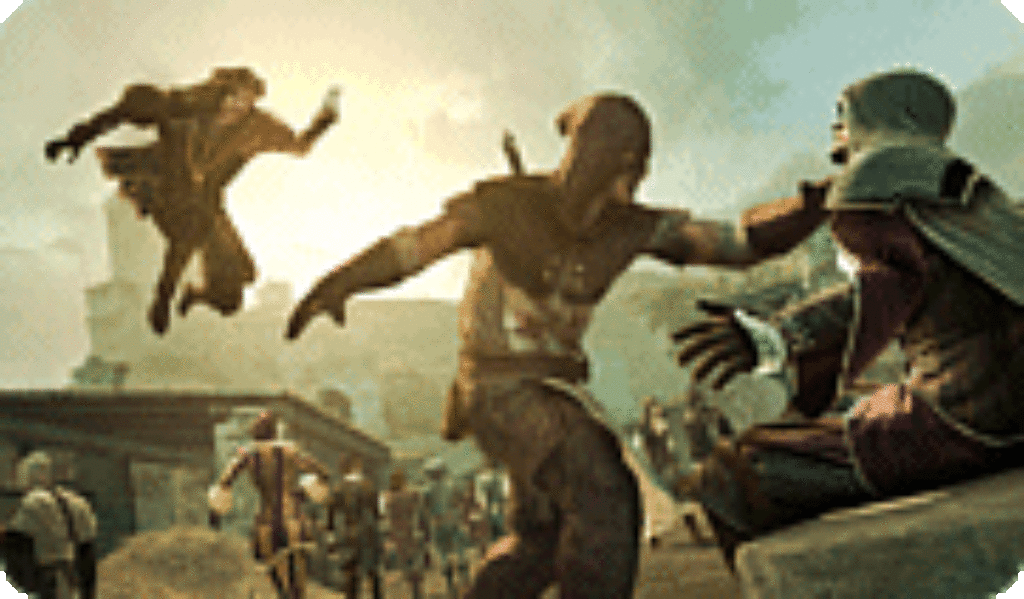
Whether we’re talking about movies or video games, success predictably begets sequels. That’s why software publisher Ubisoft has unleashed the next installment in its 20 million-selling, M-rated Assassin’s Creed franchise, Brotherhood, only one year and one day after the last title in the series hit store shelves.
Once again, players don the dark, hooded cowl of master assassin Ezio Auditore. This time around, most of the action revolves around his skulking exploits in Rome as he attempts to break the tyrannical stranglehold imposed by the evil family that controls the Vatican.
Paging Dan Brown … Again
The core conflict in the Assassin’s Creed series revolves around the attempts of two rival groups to possess the powerful Pieces of Eden, ancient artifacts allegedly behind many of the Bible’s miracles.
On one side, we have the Knights Templar. These agents of an exceedingly corrupt Catholic Church, headed by the Borgias, will stop at nothing to subjugate those who oppose them. Or, as one character says, “enslave us all.” Villainy, not piety, drives this shadowy group.
On the other side, we have a brotherhood of “noble” assassins dedicated to, as the game tells us early on, “safeguarding humanity’s free will.” These skilled killers employ their cunning craft, we’re meant to believe, on behalf of those oppressed by religion run amok. Just as Bob Hoose described in our review of Assassin’s Creed II, so Brotherhood again features ” enough ancient intrigue and religious conspiracy twists to make Dan Brown wish he’d dreamed it all up for his next novel.”
As was the case in Brown’s Da Vinci Code, it’s a conflict that spans centuries. But most of the intrigue here centers around Ezio in the years 1499 and 1500. (Some of the action also erupts in the present as his ancestor, Desmond Miles, battles the modern progeny of Knights Templar, the dark mega-corp. Abstergo, which seeks to mine Desmond’s DNA for information about his forbears … and the Pieces of Eden.)
Ezio is desperate to retrieve the Apple of Eden, which has been stolen—along with his lover, Caterina—by the merciless Templar leader Cesare Borgia. But retrieving the Apple and Caterina requires much more than a single, surgical strike on Borgia’s stronghold in Rome—even for an assassin as skilled as Ezio. That’s because Borgia commands the papal army. Successfully liberating his girl and the prize, then, requires taking territory (towers) away from Borgia’s forces. Capture the towers, kill the commanders, and that area’s influence and resources—including stables, banks, blacksmiths, tailors and brothels—suddenly shifts to Ezio.
Thus, in addition to putting a permanent end to his enemies, Ezio must exercise a fair bit of strategic thinking regarding the best plan of attack and the resources at his disposal. Along the way, he’s also able to recruit others into the assassin’s guild, agents whom he can subsequently summon for certain attacks.
Spilled Blood, Suspended Salvation
The related violence isn’t extravagantly gory, but neither is it sanitized. Blood is visible when you thrust enemies through with a sword, for instance. Killing is divided between frontal attacks and clandestine assassinations. But what’s got folks really talking is Brotherhood’s new combination attacks. “Ezio can now kick an enemy to open him up for a hit,” writes ign.com reviewer Cam Shea. “Why just run a guy through with a sword when you can slash him then shoot him in the face? These new combo kills are brutal.”
A sensual scene involves Ezio being seduced out of a bathtub by Caterina, who drops her robe to show that she’s wearing only a corset and panties. Players then see the pair passionately kiss as she straddles him on a bed. The next morning they’re under the sheets together. Also, a madam at a brothel is an ally to Ezio until she’s killed, after which he helps restore her house of ill repute. Language has actually been reined in a bit from past episodes, but we still encountered some light profanity in English along with a few f- and s-words in Italian. (Subtitles spell them out in English.)
All of that is combined with a sizable slice of hostility directed toward the Catholic Church. There’s simply nothing here that might lead anyone to believe that genuine salvation stems from Christianity. Instead, Ezio at one point encounters a vision of the goddess Minerva (via the Pope’s staff, no less), who tells him that he must locate her lost temples if he’s to save the future.
And speaking of the future, I suspect this won’t be the last time we’ll be forced to deal with the problematic themes and images the Assassin’s Creed franchise has so consistently aimed at its huge number of fans.

After serving as an associate editor at NavPress’ Discipleship Journal and consulting editor for Current Thoughts and Trends, Adam now oversees the editing and publishing of Plugged In’s reviews as the site’s director. He and his wife, Jennifer, have three children. In their free time, the Holzes enjoy playing games, a variety of musical instruments, swimming and … watching movies.